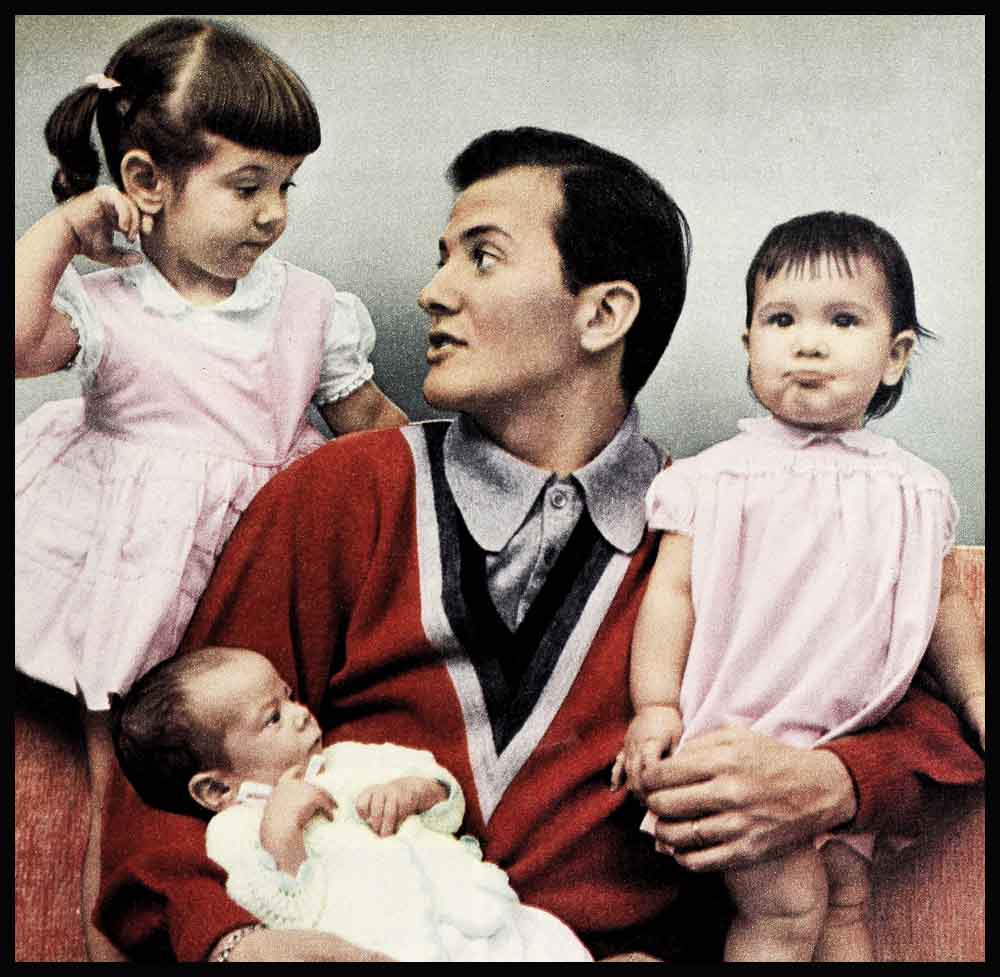
The Pat Boone Story
ON A SLATE-GRAY, bitter cold afternoon in February, a young couple from Leonia, New Jersey, bundled their three children in snowsuits, mittens and galoshes, and locked the front door of their snug little home. For Pat Boone, his wife Shirley and their youngsters were leaving for Hollywood.
When Pat shut the door of his house, he also closed a chapter in his life. Behind lay Pat the singer, whose records had been on the top ten list for thirty-eight out of fifty-two weeks and who, measured by the fan-club yardstick, is the country’s most popular vocalist. Ahead for Pat lies a career as an actor. complete with a longterm contract with 20th Century-Fox and a starring role in his first picture “Bernardine.” For twenty-three year-old Pat whose only acting experience has been in amateur productions at North Texas State College this offers a great challenge. Everybody is rooting for Pat who keeps asking. “Can this really be happening to me?”
AUDIO BOOK
Even as he turned the key in the front door that blustery winter’s day, Pat couldn’t believe that it was true. He put his arms around Shirley and said, “Honey, let’s keep our fingers crossed.” Then he picked up two-year-old Linda and handed her to Eva, the nurse, who was sitting in the back seat with baby Debbie and Cheryl, affectionately known as “Cherry.” Pat and Shirley climbed into the front and they drove off to the airport.
As they flew westward through the darkening sky Pat thought back over his life. Of the wonderful twenty-three years that had made history for Pat Boone. Hollywood seemed a long, long way from the tiny stage of the Belle Meade Theatre in Nashville where he had made his professional debut at the age of ten. Pat, of course, had been singing ever since he could talk. And even before that. Neighbors recall Pat at the tender age of two, crawling all over the Boone house in Nashville, crooning to himself as he went. One of them says, “We all said that Bing had better watch out.” And when he was older he had sung in the choir at church, and whenever there was a gathering of friends and neighbors Pat would be called upon to sing a hillbilly or cowboy song. Even then Pat had a way of making the folks listen whenever he started to sing. There was an earnest sincerity about him that seemed to touch people’s hearts even when he sang the simplest cowboy ballads or one of the fine old hymns.
That night on the stage of the Belle Meade, when Pat was introduced as “the next Bing Crosby,” nobody, certainly not Pat, could have conceived that this prediction would some day come true. Pat sang a Western called “Single Saddle,” and all he remembers about it is that he was dazzled by the footlights, which nearly came up to the top of his head, and frightened by the sea of blank faces that stretched out in front of him. But even after a resounding roar of applause had followed his small figure into the wings, Pat didn’t believe that they were clapping for him. Even now, with fame reaching out to him, he doesn’t think he’s much of a singer. “I simply can’t imagine myself as a really big singer,” he said recently. “I know all these things are happening, but it seems to be happening to somebody else.” But if Pat didn’t think much of himself as a singer in those days, the folks in Nashville never had any doubts about his talent. One of his relatives says, “Pat had hardly a free moment to himself. Church groups around town were always asking him to sing at a social. And then of course he sang in the choir of his own church, the Church of Christ, at the Sunday Services and at the Wednesday evening prayer meetings. Pat, you know, has been going to church since he was six weeks old. His mother used to carry him in her arms.

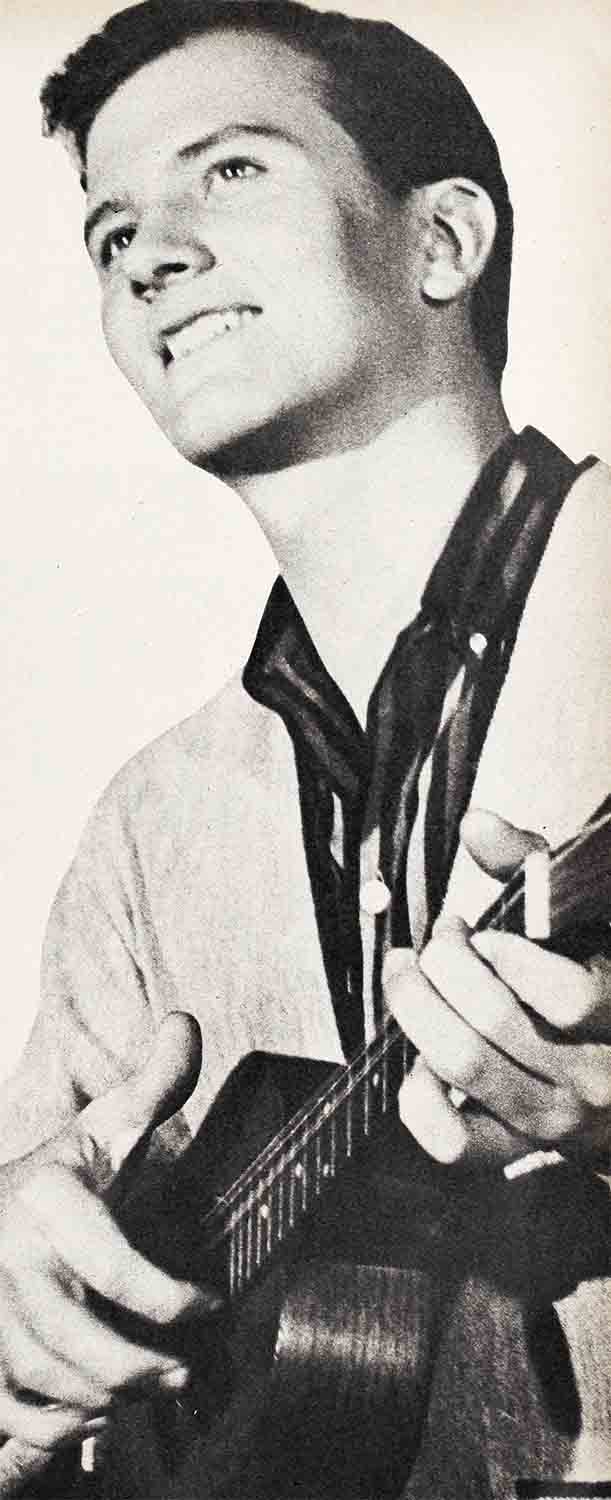
“And whenever he went to parties the first thing his friends would ask him would be, ‘Pat, did you bring your guitar?’ Everybody in Nashville knew about Pat’s singing and playing and they thought he ought to be on radio. Every time they spied the head of the local station they’d grab his arm and say, ‘When are you going to give Pat a chance?’ Well, he finally broke down and Pat at seventeen landed his own show. A year later he won the East Nashville Talent Contest and got a bid from Ted Mack in New York to appear on his ‘Amateur Hour.’ ”
That was, of course, the turning point in Pat’s career. Everybody in Nashville predicted Pat would make good and when they saw him on their TV sets and heard the applause they knew he had.
In New York, Pat’s whirl-around-the-clock schedule keeps him hopping
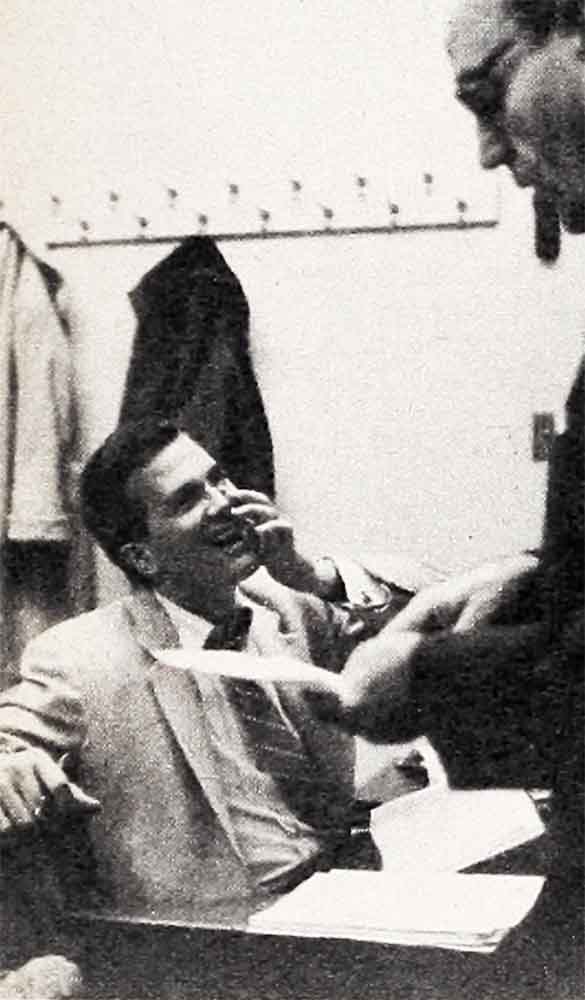
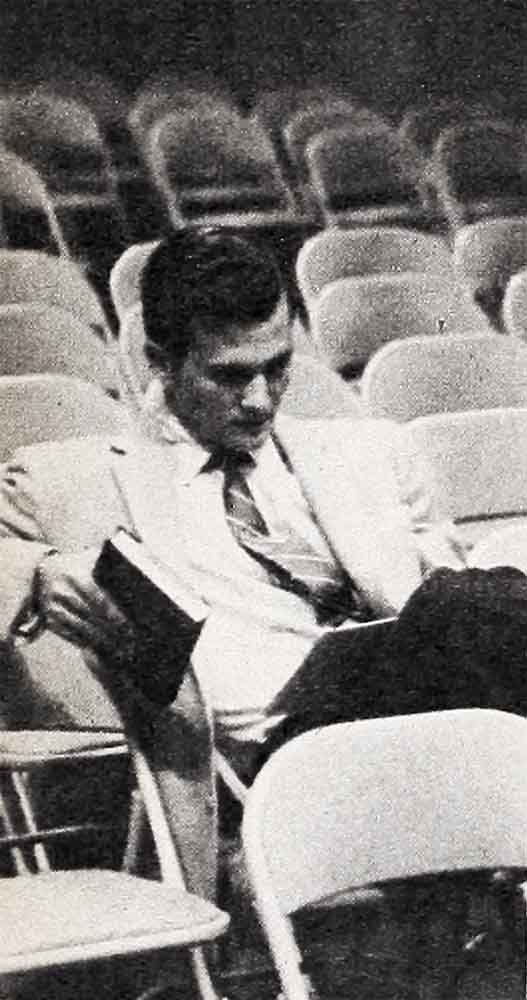
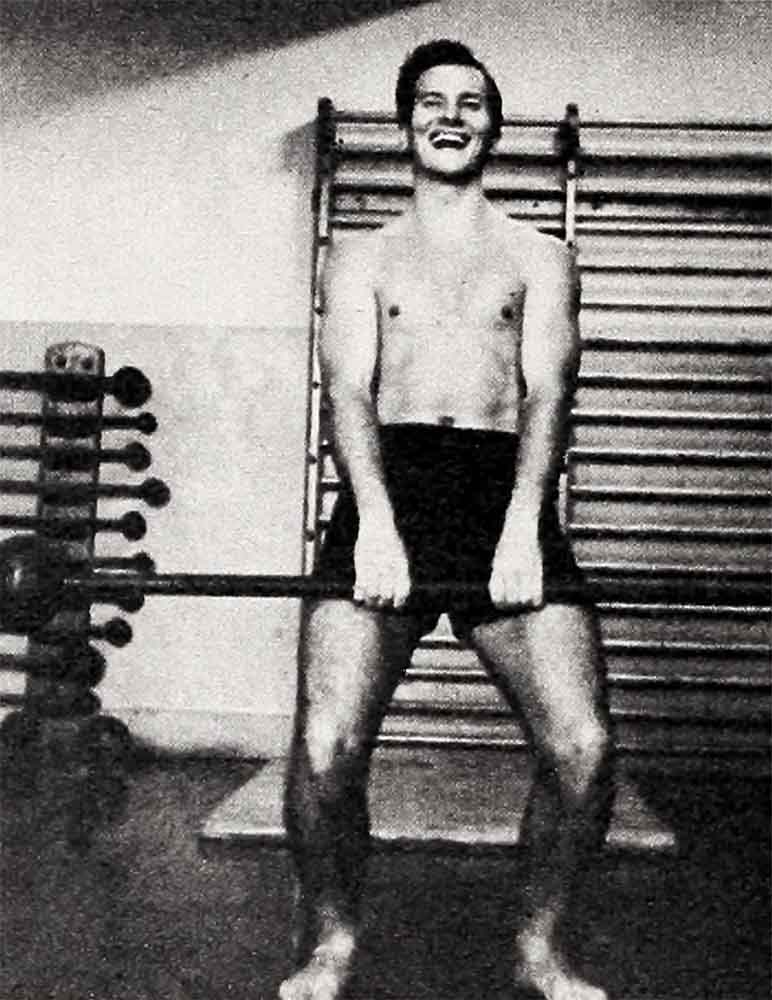
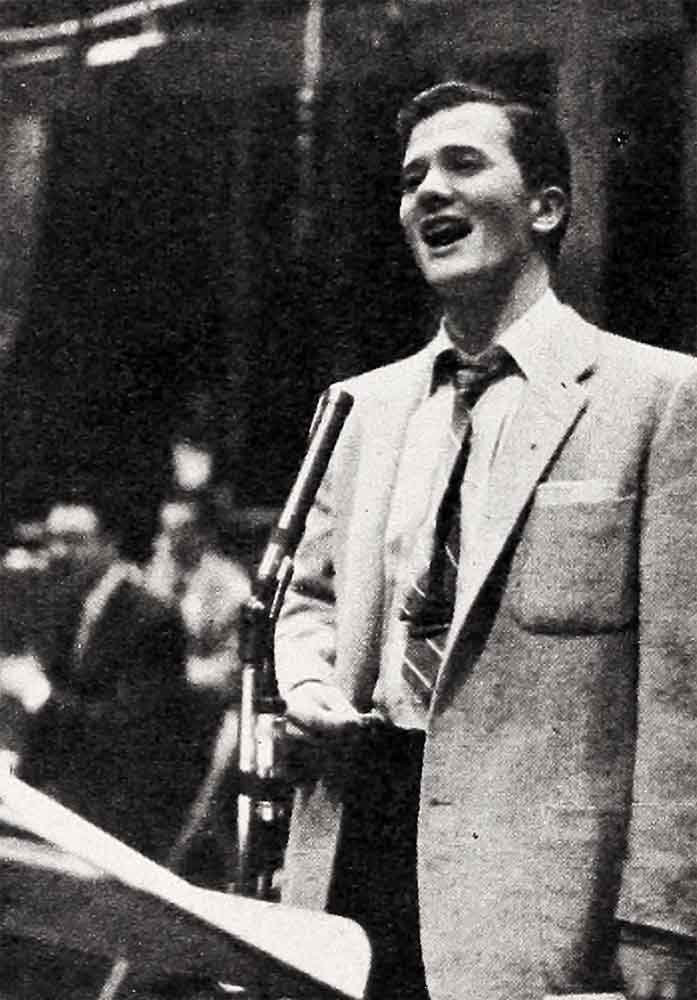
If the audiences loved Pat so did the people on the program, who thought he had what it takes to be a great performer. Sure, there were a few rough edges to his singing and his stage presence but this made Pat only that much more appealing. They liked his personal charm and warmth and were inspired by his deep religious convictions.
As a three-time winner on the “Amateur Hour,” Pat was qualified to be in the Madison Square Garden finals. Of course, he would have gone back to be in the finals but something even bigger than his career stood in the way.
Pat and Shirley Foley had just eloped and moved to Texas.
Looking back on those wonderful days of love and courtship and marriage, Shirley says, “We were both nineteen and it seemed sort of crazy at the time. But Pat and I had known each other for four years—had seen each other every day—and we felt deep in our hearts that it was the right thing to do.”
After they were married Pat and Shirley stayed on in Nashville for several months but it wasn’t the same as before, somehow. While the families had forgiven the young couple, a feeling of disappointment that they had married so young still remained. Pat and Shirley felt that they had to fight for their marriage, that it would be best if they went away for awhile to think things out for themselves.
Pat and Shirley packed up their few belongings and drove to Denton, Texas, where there was a Church of Christ college, North Texas State.
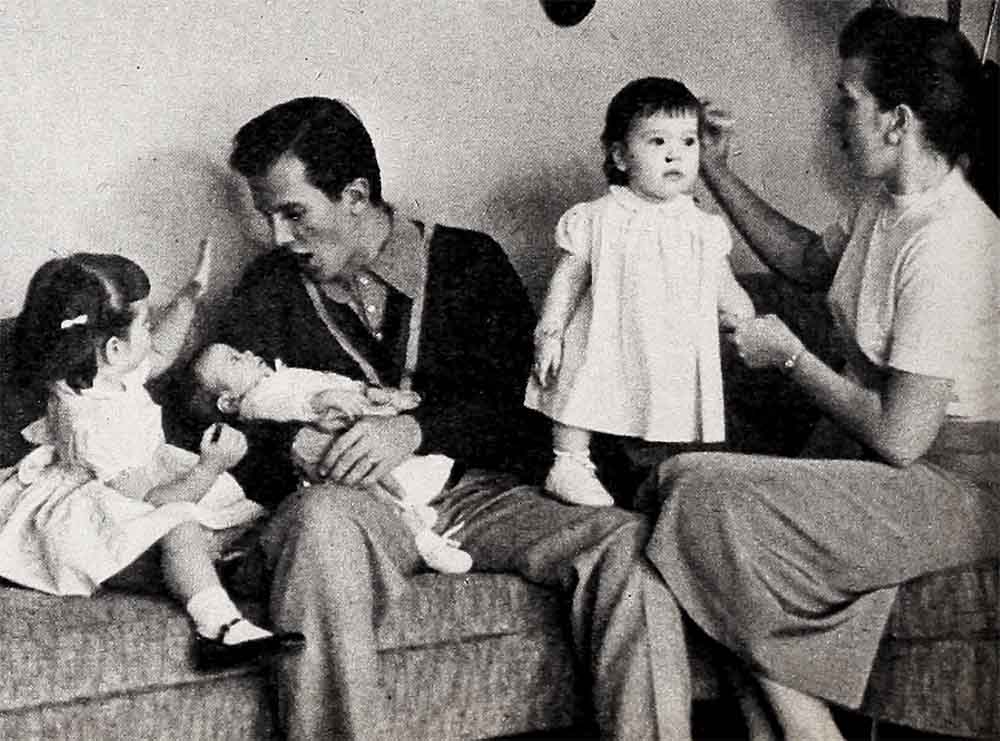
“We’d made up our minds,” Shirley says, “that come what may Pat was going to finish his education. Pat and I had talked this over many times. Sometimes when he’d feel blue and disgusted he’d say, ‘Oh, Shirl, it’s such a struggle.’ And it was. But Pat really wanted to amount to something more than just being a little old country singer. If he could be a real success as an entertainer and through his singing in some way help others, this would be fine. But if this didn’t work out Pat wanted to feel that he could teach or enter the ministry.”
Pat and Shirley were probably happier in their little home in Denton than they had ever been in their lives. Pat, after he had enrolled at college, went down to Fort Worth the same day and eventually landed a job singing hillbilly songs on a local TV “barn dance” program. He raced home that night and said, “Honey, we’re going to be all right. I just signed up for a big TV program.” And added with a sheepish grin, “For fifty dollars a week.”
“Fifty dollars,” shouted Shirley, who was then several months pregnant. “Pat, it sounds fantastic!”
All he could say was, “Shirl, baby, I’m just so happy.”
After little Cherry arrived, Pat and Shirley didn’t think there could be any greater happiness for them. “We were every bit as content then as we are now,” Pat says of those days. “We possessed few worldly possessions, we only had ourselves, but we felt this was everything. Of course, we didn’t eat quite so well as we do now,” he says with a chuckle. “For breakfast we had hash, for lunch hamburgers and for supper spaghetti and meat balls.”
But at that very moment, though Pat didn’t know it, fame was nearly in the palm of his hand.
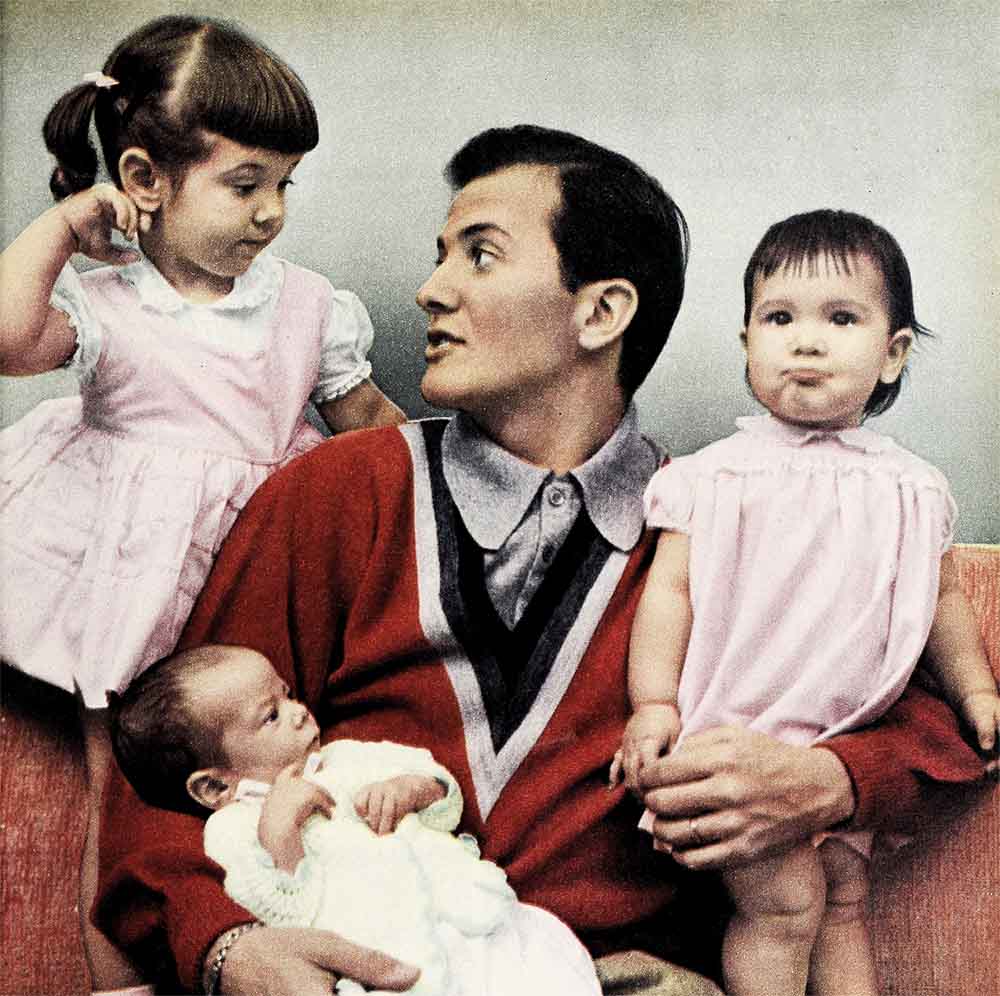
A few weeks before, he had received a letter from “Arthur Godfrey’s Talent Scouts” program suggesting that he send in a couple of recordings. Pat had them made and then forgot about them. It was Shirley who had prodded him into doing something about it in the first place.
Pat’s records along with hundreds of others piled up in Arthur Godfrey’s study at home. Whenever he got a chance Arthur would listen to a batch of them. One day his daughter, Patricia Ann, who had been sampling her father’s audition record collection, rushed up to him with a record in her hand and said, “Daddy, I’ve just heard the most wonderful singer. He’s a boy from Texas named Pat Boone.”
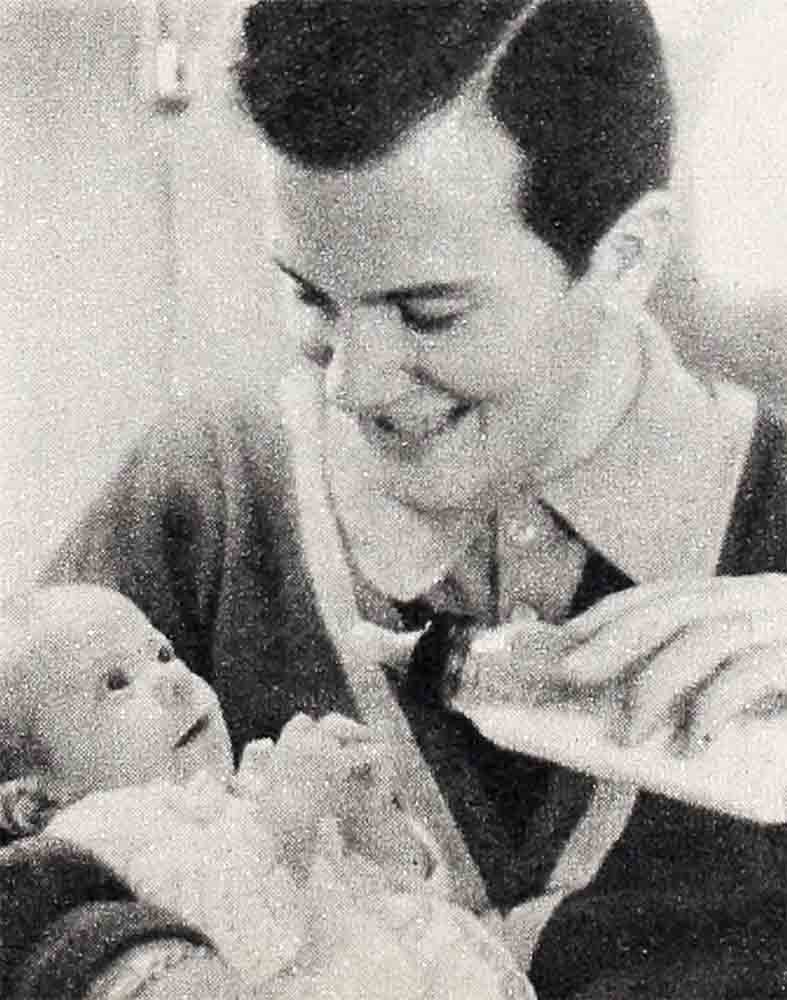
While Godfrey had never heard Pat sing, he had heard about him—from Shirley’s father, who is nearly as famous in the entertainment world as the great Godfrey himself. He’s Red Foley of “Grand Ole Opry” fame, now with his own TV show, “Ozark Jubilee.” Red’s an old friend of Arthur’s and he had once casually mentioned his son-in-law in a letter to Godfrey. But Red and Pat both deny that any special favors were requested for the young singer. In fact, Pat says, “There was no doubt in anybody’s mind that whether or not I made the show would depend on my talent and my talent alone.”
As soon as Godfrey heard Pat and met him in person, he predicted that he would be a great star. He confirmed what Ted Mack had said of Pat after his first amateur hour appearance. “I’ve watched them come and go in this business,” Mack said, “and I’ve learned that it’s the person with the stamina, the one who will work to develop his talent who will survive. I know that Pat is one of these. The public isn’t always right and wise, but in this instance it is.”
Pat got the same kind of response from Godfrey’s program that he had had on Mack’s “Amateur Hour.” The audience liked him because he was personable and sincere. They liked him even more when they discovered that he was a family man and an honor student at Columbia. And he was just as popular with everybody connected with the show. Mel Spiegel, Arthur Godfrey’s right hand man, recalls that if Pat was a couple of minutes late for a photo sitting he’d phone to apologize. “That kind of punctuality and thoughtfulness is unusual in a big star.”
One of Godfrey’s family recalls that Shirley and the children would often show up for TV rehearsals. “Little Cherry would put the cast in just the right mood by waving to Godfrey and saying, ‘Hello, Mr. Apter Goppie.’ ”
In Hollywood, it’s a new career, a different tempo for Pat as he learns the tricks of a movie star’s trade
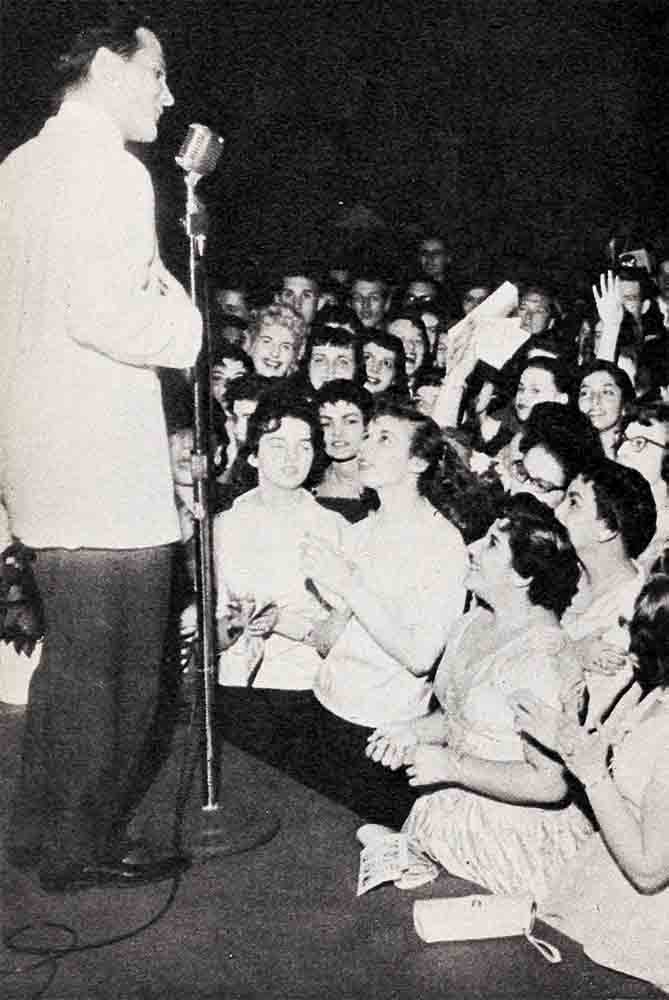
Arthur didn’t have to teach Pat very much. He’d already appeared on TV, but Pat was grateful for any advice he could get.
Godfrey was sincerely sorry to lose Pat. But for his young protege’s sake he was glad that Boone had landed his own program, to start this fail over ABC-TV, and could understand why any young man would be reluctant to turn down a contract that guaranteed him a minimum of a million dollars for five years.
What has Pat got as a singer that he has been named “Most Promising Male Vocalist,” by both Billboard and Cash Box magazines and has sold over six million records for Dot?
For one thing Pat is vocally a split personality. On the one hand, he belts out rock ’n’ roll numbers in a husky baritone, but on the other, when he does ballads, he sings sort of soft and whispery. Pat says of his two voices, “It’s not something I deliberately do. I just naturally sing that way. I approach ballads differently than rock ’n’ roll or up-tempo songs but no matter what I sing you can recognize both voices as me.”
Pat Boone doesn’t want to be tagged as a rock ’n’ roller, however, and this he feels takes him out of competition with Elvis Presley for the rock ’n’ roll crown. “I’ll stay with it but I definitely do not want to be known as strictly a rhythm singer. I want to be known as a fellow who can sing songs.”
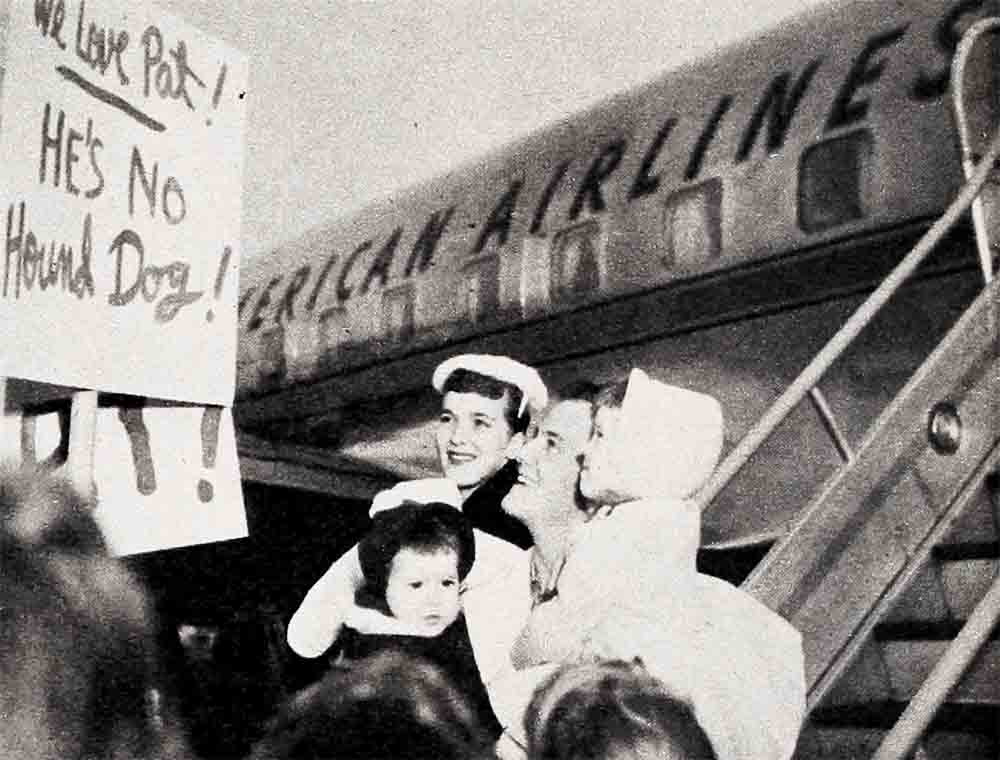
For most any other person this modest ambition would be enough to keep a fellow busy and happy. But not Pat. In spite of his record as a singer, his tremendous popularity, he has doubts about himself as an entertainer. He feels that his fans might grow tired of him, that he might lose his spark. It’s this honest self-appraisal that prompted Pat to follow Shirley’s advice and keep on with his education. “If I fail as a singer I’ll turn to teaching. In a classroom, or as a producer of educational programs on TV.”
Right at the moment Pat is on a leave of absence from Columbia University where he is a senior, majoring in speech, with additional courses in English, broadcasting and fine arts. He plans to go back to college in September and finish his final semester. Not only has Pat kept on with his education but he very well may graduate Phi Beta Kappa. This is a fact that bothers Pat a little and he wishes that there wasn’t so much publicity about it. “Now, I’m under pressure to make it. If I don’t it will make me look foolish.”
But if he doesn’t it won’t be because he hasn’t tried Until he left for Hollywood, Pat would get up at six in the morning and study before breakfast and carry his textbooks everywhere he went. He’d study sitting in his agent’s office, before a personal appearance, between recording sessions.
When he was with Godfrey, Pat, along with the rest of the “little Godfreys,” went up to Lake Placid last winter to put on a show. One morning after rehearsals the whole gang went skating and looked for Pat to join them. They finally located him in the basement of the lodge they were staying at, seated under a bare light bulb, boning up on an exam he had to take the following day.
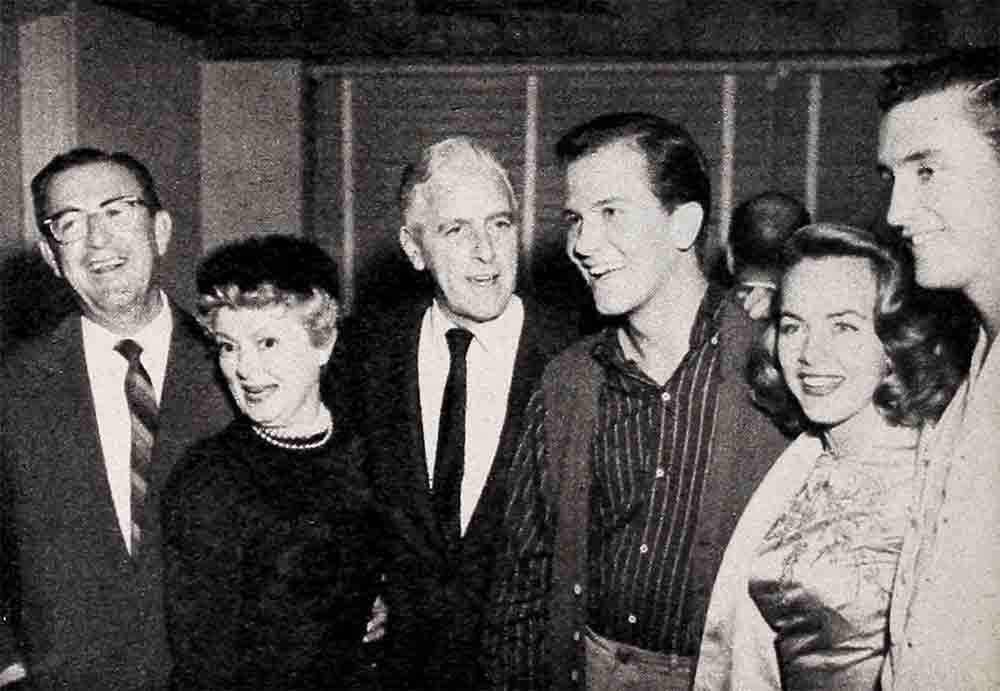
Pat is well-liked both by his classmates and the faculty at Columbia. One of the latter said of him recently, “Pat has a fine mind. If I had as many commitments as he does, I would never be able to achieve the grades he has.”
As a famous person there, Pat has problems that other students don’t have to face. He has tried very hard to be like everybody else, but this is sometimes difficult. One evening recently, Pat was preparing to do a scene from a play in his TV class. One of the coeds, when she heard that she was going to appear opposite Pat, pretended to swoon. “You mean I’m going to do this with Pat Boone?” and she flung her hand against her forehead in a gesture of ecstasy. Pat, who has a sense of humor about a lot of things, is deadly serious about his studies. He calmly said, “That will be enough of that.” The chastened girl cut out the clowning and the class got back to work, impressed by his professional approach. impressed too is his teacher who says of Pat’s talent: “He has a direct wholesome honesty that comes across both as a person and in any scene that he’s doing. I don’t think he will be a brief sensation and then fade. I think he’ll be a working artist for a long time.”
Pat is perfectly sincere about completing his education and everybody is rooting for him to finish with a bang. For instance, Kirk Douglas walked up to him at a party recently and said jokingly, “If you slip up on your degree, I’m going to punch you right in the nose.” Pat smiled and replied, “Don’t worry, I’ll get it.”
Pat had wanted to graduate with his class in June. But he has a tremendous respect for the opinions of the people who have guided his career. They said the time to make a movie was now. And “Bernardine” was the kind of picture he wanted to play in.
Pat admits to a terrible doubt after he had signed the contract. “I’m essentially a singer. I did a little acting in high school and college, but it was plain awful. The acting part had me worried.”
But Pat is not a real worrier. Neither is his wife. They have great faith in a Supreme Being who charts our lives. If it hadn’t been time for Pat to be making a movie—then he wouldn’t have been on his way to Hollywood. Obviously then, since he was on his way, everything would turn out all right.
Pat Boone’s reputation preceded his arrival in Hollywood. Preparations were made to greet him as a great new motion picture personality. A star was about blaze forth—and be emblazoned.
There was much speculation about Pat. Already one teenager idol—a rock ’n’ roll singer—had made his mark upon the town. Elvis had the Hollywood touch—the numerous high-powered cars, the bodyguard, the lavish gifts. This was all in the true Hollywood tradition.
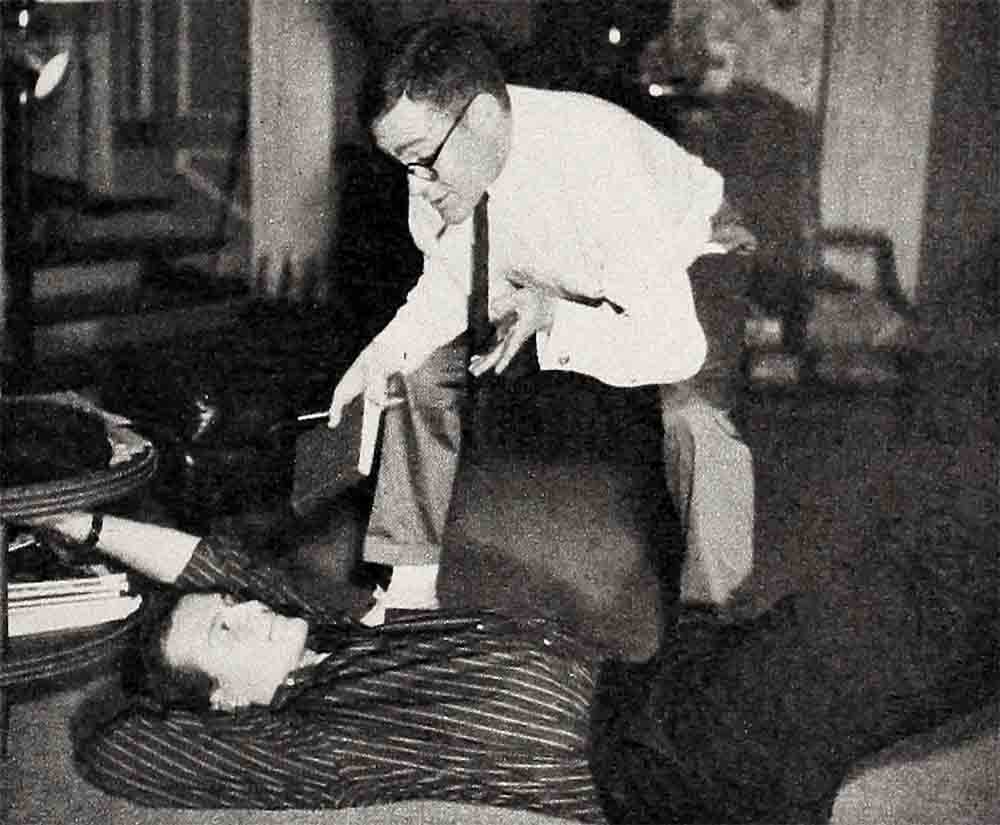
But Pat Boone gave the reporters and columnists pause, for here was not only a top singer worth a potential million but also a top student at one of the world’s great universities. This seemed like a puzzling inconsistency. They were perplexed. They didn’t know just how they’d take to Pat. Not to mention his wife and three small children!
They were in for a startling surprise. Pat and Shirley proved to be sublimely unaware that they were celebrities.
The Boones were billeted in a plush apartment hotel in two three-room suites. Shirley got a kick out of the neat little kitchenette concealed behind a bar.
“I hope the management won’t mind when they discover that we’ve only used the bar to prepare baby foods and formulas on,” she observed with a giggle.
One of her biggest thrills was the swimming pool outside their window. “Oh, Pat,” she exclaimed, “We’ll be able to swim even though it’s February. And right outside our own front door.”
Alice in Wonderland had nothing on Shirley Boone in Hollywood.
But then life had been different and exciting for Shirley ever since she met Pat at David Lipscomb High School in Nashville, Tennessee, when they were both juniors. Pat and Shirley started going steady from the very beginning. The two of them would do homework together and Pat would call at the Foley house in the morning to escort Shirley to school.
Shirley’s father, Red Foley, says, “I didn’t for a moment believe they had marriage on their minds. When my wife Eva became sick, I cared for the girls in the family, and I guess I spent more time with the younger ones than I did with Shirley and didn’t notice what was going on.”
Both families were so worried that they would just up and get married that they prevented their dating for a while, hoping that everything would simmer down.
About this time Red Foley moved to Springfield, Missouri, for his own program and wanted Shirley to join him. That’s when Pat and Shirley decided to elope. They were both nineteen and very much in love. Pat says, “It came as a kind of shock to our parents at first, but now they’re very happy about the whole thing.”
Pat’s parents and, of course, Shirley’s dad are terribly proud of Pat. And of Shirley, too, for being such a good wife and mother, for always being by Pat’s side when he needs her the most.
The day they arrived in Hollywood they found a letter from Red waiting for them. ‘I’m proud of you, Pat, and I couldn’t be happier about the kind of husband you’ve been to Shirley. But doggone it, boy, when are you going to provide me with a grandson?”
Shirley re-read her father’s letter the next morning after Pat had been whisked off to the studio and got a chuckle out of his remarks. (Red has four daughters to Pat’s three.) Shirley and Eva, the nurse, found there was plenty to keep them busy the rest of the morning.
There was the marketing, getting the children back on a routine schedule, unpacking, planning the meals.
But somewhere during the afternoon, while the children were having their naps, Shirley walked outside and sat down beside the pool. She leaned back and closed her eyes. The sun felt good. It was almost like summer.
“I thought of my friends back home, of our house and our next door neighbors. All of a sudden I got a terrible spell of homesickness. I knew it was foolish of me. After all, home is where your husband and children are. I felt sort of blue. Everything was strange. I didn’t know anybody. I was scared.
“Everything had happened so fast! Yesterday, I had been in my own house in Leonia, today I was in Hollywood. This is what I’d dreamed about! To come here and see all the sights. Pat and I had talked about actually going to a movie premiere instead of just watching it on television.
“But that first day, I thought, maybe it won’t happen. Maybe Pat will be so busy he’ll go off to work every single day, and I’ll just sit here by myself, waiting for him to get home at night. And Eva and I wouldn’t have another living soul to talk to!
“I really don’t understand what came over me. It was a silly way to feel. Maybe it was the change of climate. Well, a little while later, the phone rang. It was Pat’s agent.
“He said, ‘Shirley, do you know a girl named Nancy Hickman?’
“I nearly fainted. ‘Nancy Hickman! Of course, I know her! We grew up together. What about Nancy?’ ”
It developed that Nancy Hickman had read about the Boones’ arrival in Hollywood. She managed to locate them through the studio and a reunion between the two girls was immediately arranged. Suddenly, Hollywood looked wonderful to Shirley. She telephoned her old friend and learned that Nancy was married and that her husband, Robert Knudsen, worked for the Los Angeles Herald Examiner.
The two young couples met and immediately became great friends. As Knudsen puts it, “You can’t help liking Pat and Shirley. They’re so down to earth. They realize what has happened to them, but they also realize that it might not have happened. They keep saying how lucky they consider themselves.”
A few evenings after their arrival in Hollywood, Pat and Shirley attended their first big Hollywood party. This was the Photoplay Awards dinner—one of the town’s most glamorous affairs. To all outward appearances, they were poised and calm.
But if only people knew how they had fretted and worried beforehand. Particularly Shirley. She has an innate sense of good taste about what to wear on most occasions. Back home she was always considered to be the prettiest dressed girl in town. And that didn’t mean going out and spending a lot of money, either. But Shirley asked herself, “What do I wear to a big Hollywood party? Should I go out and buy myself something glamorous and chic?” Pat told her to dress like she always did at a party. “You wear what you usually do and you’ll be the prettiest girl there.”
“And,” Pat said later, “I was never so scared in all my life. I couldn’t get over the fact that we were in the same room with so many big, important people. Everybody we had ever seen in a movie was right there, in person. I thought: What are we doing here? Then I heard Ernest Borgnine introducing me. It was a very flattering introduction and suddenly I was on, facing that wonderful audience. Here were the greatest entertainers in the world—and I was supposed to entertain them! I was so nervous I thought they’d see my knees knocking together. I must have seemed dazed. I remember telling myself to get with it. Well, the music started and I began to sing. Everybody was very kind, and applauded and wanted more. So I sang ‘Rock Around the Clock.’ That really did it! They started clapping and stomping and you’d never think they were big movie stars. They acted just like a bunch of kids.”
Except for an occasional fancy party the Boones live in Hollywood just as they do in plain old Leonia, New Jersey. They visit with friends, go for a drive, take in a movie. They are here to see the sights, have a holiday, but all strictly according to their own lights, strictly in keeping with their own simple standards.
They are certainly not grist for the gossip columnists’ mills. They don’t hit the night spots for the sake of being seen. They have gone to a few openings at some of the plush supper clubs in Hollywood—but mainly to see the celebrities.
They are caught up in the world of Hollywood glamour, to be sure, but they are taking it all in with level-headed objectivity.
Few people here understand this simple philosophy. Most feel that the grassroots sincerity by which the Boones live, simply cannot go hand in glove with glamour, Hollywood style. Show business is show business after all, isn’t it?
Not to Pat and Shirley Boone it isn’t!
As for example, the Sunday afternoon that the Knudsens, another couple and the Boones decided they’d like to see “Around the World in Eighty Days.”
It was being shown at the Carthay Circle Theatre and all the seats were reserved. Pat phoned his agent who got six seats for them. It was one of those impulsive, impromptu arrangements as far as the kids were concerned.
Their afternoon had been casual. They were all wearing comfortable sports clothes. Nobody bothered to think about changing into anything dressier. Besides, there wasn’t time. Knudsen recalls that “Everybody in the place was all dressed up. A real mink turnout. There we were, right in the best seats in the house, dressed for a picnic! It didn’t bother us any. And Pat and Shirley were not at all embarrassed. They got a kick out of it, in fact.”
As Pat sees it, his work is a kind of calling. He always wanted to teach. In a sense, acting and singing are also a part of teaching. He is communicating with other human beings, and that, says Pat, is the basis for all human relationships.
Perhaps the full meaning of the Boone way of life can be found in Pat’s approach to singing on TV or acting in the movies. Over lunch at the studio commissary (“I like to eat here—because every day I get to see some more famous people!”) Pat said, “I know there are millions of people out there, watching me, listening to me sing.
“I concentrate and think of only one person. If it’s a love song, I look into the camera and see Shirl. I sing right to her. If it’s a happy, light-hearted song, a bright little thing, I imagine one of my kids in the camera, making funny faces at me. That makes me smile. And then I’m singing right to her and she’s laughing back at me. It’s important to reach one, and that way, maybe you reach all.”
Thinking in terms of millions is not thinking in terms of the direct human equation, he adds. Whether they are people—or dollars!
Which goes a long way to explain why the Boones can look at the big Hollywood mansions with wonderment and even awe and never picture themselves in such surroundings.
About their own three-bedroom house in Leonia, Pat says, “We hunted all over to find a place that would have some rural country to it. This is it. It’s only twenty-five minutes from New York City, yet we don’t live a city life.
“We fixed up the basement with a playroom for the children and a study for me. Cherry tries to get in, but we worked out something very tricky. We put a doorknob on my study that’s too high for her to reach. She bangs for a few minutes, then she goes upstairs to Shirl. That’s where Shirley’s job comes in. She keeps the children quiet, keeps the whole place quiet, so I can concentrate on my studies.
“Shirl’s very understanding about things like that. She knows that lots of times I can’t get home in time for dinner. Maybe she cooked something very special, too. Well, I’m sorry about times like that—but she doesn’t mind. She understands it’s my work.
“Then, if it isn’t too late, sometimes we have a snack with the people next door. They’re good neighbors.”
“Would you like to make your home in California?” he was asked.
“Shirl and I love it here—but we’ll have to be back by September so I can finish school.”
“What about your neighbors—your friends? Wouldn’t you miss them if you came here to live?”
“Yes,” he said, “but you can have nice neighbors no matter where you are. If you just show you want to be nice to them—and friendly—people understand. We’ve always found it that way.”
But they aren’t thinking in terms of living here permanently, as yet. To them, California is a grand holiday, a tourist dream, an exciting excursion. They came to see the sights, and they are seeing them. Pat rented a station wagon when they got here because wherever they go—the whole family, including Eva—goes along also.
One of their big side trips was visiting Palm Springs. Pat told his manager they’d like to go “because Shirl and I want to see some of the celebrities. Maybe we might be lucky enough to see Bing Crosby.”
The wiseacres say: “They’ve got to gradually learn that they are part of the glamorous picture of Hollywood now, not just tourists on a sightseeing trip. Shirley’s got to go out and dig up the right kind of clothes for Hollywood. She’s no longer just another housewife in Leonia. And it’s about time they traded in that beat-up station wagon for a Jaguar or at least a Thunderbird. And what about their own swimming pool? They certainly can afford all those things.”
But there is an overtone of hopelessness in their tired voices. For no matter what they do, they can’t seem to drum it into those kids’ heads that they are part of the Big Parade! No matter what they say, Pat and Shirley Boone continue to be awestruck, bright-eyed and open-mouthed by such average sights as a brilliant sunset, a cactus plant in bloom, or a glimpse of Bing Crosby.
The Boones did indulge in a new Jaguar—but this they definitely regard as splurging on a rare, longed-for luxury.
Two evenings a week, they attend worship service at the non-denominational Church of Christ. Pat is a song leader. The service lasts from 7:30 to 8:30. This for the Boones is fairly immutable. Therefore, it could conceivably revolutionize the dining habits of many of Hollywood’s most important hostesses who are already vying to entertain “the charming Boones.” The Boones are most disarming about it. They’ll come—but after 8:30.
So, if you’ve been wondering what Hollywood will do to the Boones—don’t!
Because sophisticated Hollywood is now wondering just what Pat and Shirley Boone are going to do to it!
THE END
It is a quote. PHOTOPLAY MAGAZINE JUNE 1957
AUDIO BOOK




